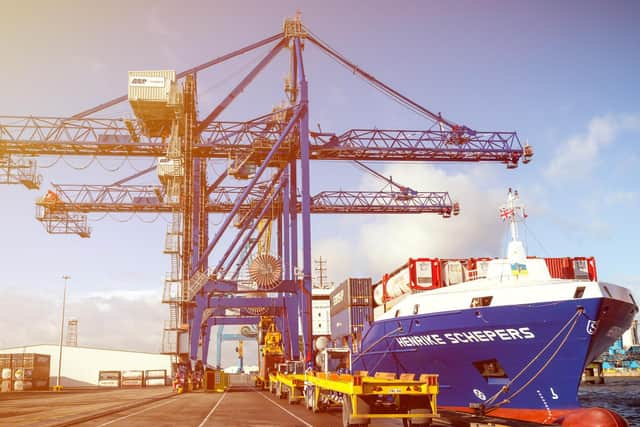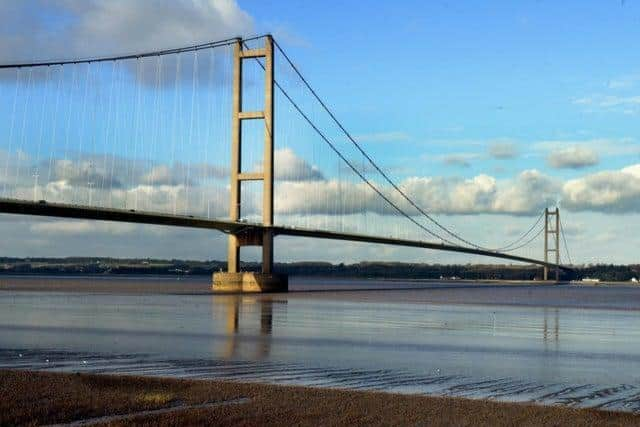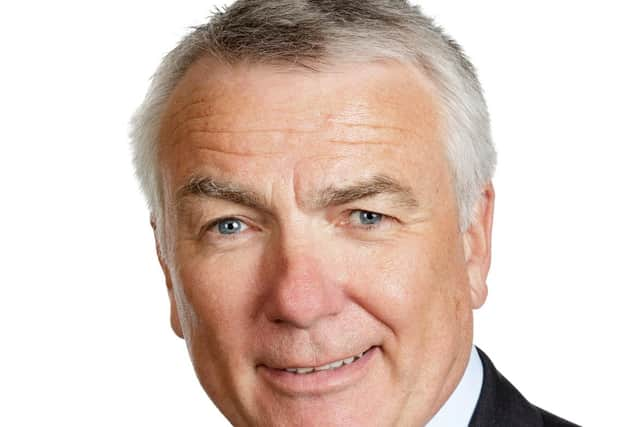'The economy of the Humber is set to change forever', ABP boss Simon Bird salutes exciting new chapter for the region
Appropriately enough for someone who has run Britain’s largest port network for more than six years, Simon Bird has spent much of his career concerned with all things maritime.
The Associated British Ports director for Humber began his career with a short service commission in the Royal Navy.
Advertisement
Hide AdAdvertisement
Hide AdHe would later join British Aerospace and spend time working in the likes of Indonesia and Brunei.


Before long, however, he was headhunted to work for the old Mersey Docks and Harbour company which later became Peel Ports, before working as chief executive of the port at Bristol for 15 years.
He even retains to this day a link with the Forces, having an honorary commission in the Royal Navy. Indeed, the evening prior to our interview he spoke with the First Sea Lord by telephone.
So when I, rather clumsily, put it to him that he has always enjoyed the sea air in his lungs, he laughs down the Zoom line, saying that – from his offices in Immingham – he was looking out over a rather brown, rather flat estuary that brings the River Humber into England.
Advertisement
Hide AdAdvertisement
Hide AdAs a veteran of more than twenty years in the sector, Mr Bird has gotten to known his way around the port world better than most and today oversees the operations across the ports at Hull, Immingham, Grimsby and inland at Goole.


“Cargos don’t really change although technologies change dramatically,” he said.
“We are an island so a great deal of what we consume comes in by sea and goes out by sea.
“So I have been around three of the biggest ports in the UK. But with ABP, when the opportunity came to run the biggest port complex, it was a great challenge and opportunity for someone at that time in my career.
Advertisement
Hide AdAdvertisement
Hide Ad“The diversity of trade we handle, the international sector and the sheer scale of it means I have got a lot of interesting customers. We feed the economy.


“There is a lot of interesting work, at both a local and international level.”
The result of this diversity of work is that no two days are ever the same for Mr Bird. He began his duties on the day we speak with a 7am safety inspection with one of his colleagues.
His tenure in charge of the port network comes as the region, which sits astride the River Humber, prepares for arguably its biggest change in direction in a century.
Advertisement
Hide AdAdvertisement
Hide AdTraditionally the most polluting area of the country, the area has in recent years begun to attract substantial inward investment into green energy and decarbonisation industries.
The likes of Siemens and Able UK are making the region a major epicentre for offshore wind turbine manufacturing. Carbon capture projects are gathering steam. Plans for hydrogen plants are afoot and Europe’s first processing site for rare earth, used in electric cars, is proposed for the area.
These developments were followed in early March with the news that the Humber had one designation to become a freeport.
The application was something Mr Bird was instrumental in drawing up and, when assessing which areas should win designation, the area’s number came top when it came to meeting the Government’s criteria.
The impacts are set to be, in his view, seismic.
“I think it is transformational for the region,” he said.
Advertisement
Hide AdAdvertisement
Hide Ad“I don’t use that word too easily. We are often known as the ‘energy estuary’ but we do have some carbon generators.
“But those companies that are producing carbon are also big employers and big investors, and the fact that they are involved in carbon capture schemes also shows that they want to be players in that. It is only going to provide investment and jobs for people who live and work in the region – ditto offshore wind and freeports.”
The freeport designation will mean that the area covered by ABP’s operations will be home to Customs Zones in which goods will be free of duty until as and when they leave.
There will be tax zones established in Goole, in East Hull, which includes the Saltend Chemical Park and part of the Yorkshire Energy Park and a third west of Immingham, which will include the Able UK site for offshore wind. And above this there will be stamp duty relief, capital allowances on plants, National Insurance relief on some salaries, to name but a few added benefits.
Advertisement
Hide AdAdvertisement
Hide AdMr Bird said he expected the Siemens railways factory to become a centre of excellence for the rail industry and that the settlements on both banks of the Humber to attract more investment into green energy projects in the future.
“They will provide that catalyst and trigger for the areas where they have been selected,” he said.
The knock-on impact for ABP as a result of this is self-evident and Mr Bird’s firm has, even before the freeport announcement, invested heavily in its facilities, particularly a new container terminal.
“We are a port operator and owner,” he said.
“My interest has always been about seeing more ship and tonnage on the Humber. That is my day job. But this is a game changer for the Humber.”
Advertisement
Hide AdAdvertisement
Hide AdIn the run-up to Christmas, ports on England’s southern coast were hit by well-publicised delays, leading to colossal queues of lorries.
However, at ABP’s Humber operations it remained business as usual.
Mr Bird hopes the need to be greener will see operators favour northern ports like his rather than its southern counterparts.
“We see a number of retailers looking to move from Dover/Calais out to services coming into the Humber.
“If you are putting your cargo nearer to the destination, your truck driver is going to be more efficient than going through the Channel Tunnel and driving north.”